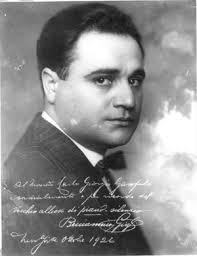 We have reached the end of our little series dedicated to the Songs of Naples.
We have reached the end of our little series dedicated to the Songs of Naples.
Of course I had to do my personal selection of recordings and many will miss the voices of Francesco Albanese or De Muro Lomanto and many others, who made many fine recordings of this repertoire. Of the restricted numer of songs I was able to present I chose those recordings which were not „only“ well sung, but which I considered to best represent „anema e core“ of these songs; and I chose those singers who in some cases did not have the most impressive voices, but who were sensitive and charming singers and really were catching the essence of the songs and the lyrics..
Quanno a femmena vo´ (lyrics: G. Ingenito & music: Vincenzo de Crescenzo)
Beniamino Gigli
Gigli here in a recording from 1925 is at his best. He has a verve and a „springiness“ which seem to have him bounce out of the loudspeakers any minute. You can see him smile through this song (a smile which you rarely see in any of his photos) and he tosses it off with a rare freshness and a delightful „tongue-in-cheek“ attitude.

Vicenzella tesseva afravola
Notte e´ ghiuorno vicine o´ telare,
A´ spuletta, a faceva vulare:
Tu-tu-tu, Tu-tu-tu, Tu-tu-tu
Faticanno, sta bona guagliona,
Na canzona cantava d´ammore,
Cu na voce ca propete o´ core,
´mbarzamava e´ faceva accussì:
Turi-turi-turò, turi, turi, turà:
Ai voglia e´ di no
Ai voglia e´ spià,
Quanno á femmena vo´:
Dint´ ´allúocchie t´´o ffà!
Turi-turi-turò, turi, turi, turà:
Ai voglia e´ di no
Ai voglia e´ spià,
Quanno á femmena vo´:
Dint´ ´allúocchie t´´o ffà!
Finalmente sta nenna spusaie
D´´o paese nu rico cafone,
Doppo n´anno, o´ facette barone
Tu-tu-tu, Tu-tu-tu, Tu-tu-tu
Chistu chiochiere jeve ´ncampagna
E lasseve tessenve a´ mugliera,
Quann´ á casa turnave ´a la sera
A´ truavava cantanne accussì:
Turi-turi-turò,…
Suspettuse, na sera turnvae
N´ora primma pe´ sta cchiù sicure,
Ma sentette, purzì, dint´o scure
Tu-tu-tu, Tu-tu-tu, Tu-tu-tu
Piglie a´ scatola, appiccia o´ cerino,
E ´tramente smiccea a´ cannela,
Vincenzella, cummoglie c´a tela
O´ ntrezzette e´cantaie accussì
Turi-turi-turò,…
– – – – –
Vincenzella was weaving her dowry
Night and day at the loom
Making the suttle fly:
Tu-tu-tu, Tu-tu-tu, Tu-tu-tu
As she worked
She sang a song of love
In a voice hat went straight to the heart
which went like this:
Turì-turì-turò; Turì-turì-turò
you can tell her: no
you can spy on her –
when a woman wants to
she´ll do it right in front of your eyes.
Turì-turì-turò; Turì-turì-turò
you can tell her: no
you can spy on her –
when a woman wants to
she´ll do it right in front of your eyes.
Finally the lass got married
to a rich yokel in the village,
after a year, they made him baron
Tu-tu-tu, Tu-tu-tu, Tu-tu-tu
This cabby had to go to the the country,
and left his wife to weave
when he came home that evening
he found her singing like this:
Turì-turì-turò; Turì-turì-turò …
Suspicious, one night he returned
An hour early
and behind the shutters he hears
Tu-tu-tu, Tu-tu-tu, Tu-tu-tu
He lightens a match,
And meanwhile blows out the candle
Vincenzella, his wife´ with the fabric
And something else, and sings like this
Turì-turì-turò; Turì-turì-turò…
Reginella (1917) (lyrics: Libero Bovio & music: Gaetano Lama)
Giuseppe Di Stefano
Gaetano Lama also composed Silenzio cantatore,Tu ca nun chiagne, ‘O Paese d’o sole, Chiove or Guapparia. He composed Reginella in 1917 and in that year the song won the Piedigrotta Festival.
Di Stefano also is at his irresistable best. The year is 1945 and apart from this one-in-a-million-timbre he really charms one to tears here with his boyish sensitiveness.. And in these early recordings one still hears a lot of Schipa´s influence on his singing.

Te si’ fatta na vesta scullata,
nu cappiello cu ‘e nastre e cu ‘e rrose…
stive ‘mmiez’a tre o quatto sciantose
e parlave francese…è accussí?
Fuje ll’autriere ca t’aggio ‘ncuntrata
fuje ll’autriere a Tuleto, ‘gnorsí…
T’aggio vuluto bene a te!
Tu mm’hê vuluto bene a me!
Mo nun ce amammo cchiù,
ma ê vvote tu,
distrattamente,
pienze a me!…
Reginè’, quanno stive cu mico,
nun magnave ca pane e cerase…
Nuje campávamo ‘e vase, e che vase!
Tu cantave e chiagnive pe’ me!
E ‘o cardillo cantava cu tico:
“Reginella ‘o vò’ bene a stu rre!”
T’aggio vuluto bene a te!…
( Oje cardillo, a chi aspiette stasera?
nun ‘o vvide? aggio aperta ‘a cajóla!
Reginella è vulata? e tu vola!
vola e canta…nun chiagnere ccá:
T’hê ‘a truvá na padrona sincera
ch’è cchiù degna ‘e sentirte ‘e cantá…
T’aggio vuluto bene a te!… )
– – – – –
You’ve made yourself a low-cut dress,
and a hat with a ribbon and roses
you were with three or four café singers
and you were talking french…didn´t you?
It was the other day that I met you,
Oh yes, it was the other day in via Toledo.
I loved you
and you’ve loved me
Now we do not love each other anymore,
but sometimes you think of me in a distracted way
Reginella, when we were together
we only had bread and cherries to eat
we were living on kisses, and what kisses!
you were singing and crying for me
and the little bird used to sing along with you
Reginella, do you love this king?
I loved you…


Bellissime scelte, Selma, riguardo a Gigli ricordo su questo sito un impietoso confronto tra Gigli stesso e Armiliato nell’interpretazione di questa canzone : ovvero tra chi pratica l’affondo e chi ha una corretta tecnica. Rimando i curiosi a quel confronto, che vale molto di piu’ di letture di trattati sul canto.
Infatti quando l´ho scoperta scegliendo la registrazione di Gigli sono rimasta a bocca aperta. A Recanati poi, inteso come “omaggio” a Gigli…. Qualche buuu ha preso però. Lieta di condividerla con voi:
http://www.youtube.com/watch?v=V3VAGVwZbu8
Terribile come sempre.